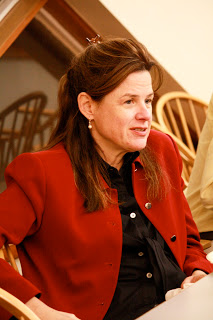- Public Policy
- Leadership
- Funding
- News & Events
- About the Center
Back to Top Nav
Back to Top Nav
Back to Top Nav
Back to Top Nav

Victoria Nourse, Professor of Law and Director of the Center for Congressional Studies at Georgetown University Law Center, came to Dartmouth last week to discuss the 1994 Violence Against Women Act and the resurfacing of women's equality issues in the so-called "war on women." Having served as an appellate lawyer for the Department of Justice and as senior advisor to now-Vice President Biden on legislative matters, Nourse addressed the issue of under-representation of women in Congress. Before commencing her lecture on The Lost History of Legislation on Women and Violence, Andres Ramirez '14 sat down with Victoria Nourse to delve deeper into her life and aspirations.
Andres Ramirez (AR): What drew you into law? What is your recommendation for those who are currently pursuing this career path?
Victoria Nourse (VN): I went to law school because I could not decide on what I wanted to do. My main interest was in engineering, but I also enjoyed history. After my first semester in law school, I fell in love. It was a combination of math and science with a real world aspect of history. It catered to all my interests and I truly found something that has nurtured into a lifelong passion.
As for those pursuing law, I highly recommend coming to Georgetown Law Canter. But, before you attend any law school, you should invest in visiting law school classes and asking students about their experiences. You should come prepared knowing what field of law you want to study before investing the time and money in law school.
(AR): Do you prefer teaching over practicing law?
(VN): Personally, I have enjoyed both. I have, however, practiced most of my life as an appellate lawyer. My primary role was trying to save the government money. As a lawyer, I got a kick when doing cases, but I enjoy the more relaxed environment of teaching. I have taught both criminal law and equality. Unfortunately now that I am writing, it is hard to do it all.
(AR): What ignites your passion for fighting for women’s rights in Congress?
(VN): To be honest, Joe Biden. When your client wants you to do something, you get passionate. You have to put yourself in someone's shoes and see from their perspective. I happened to be the perfect person in the room, and when asked to work on the bill, I took it on. Since then, I have had a lifelong passion in helping victims and understanding the law.
(AR): There have been many laws and legislation to increase equality between men and women. Do you think women will gain more equality, especially in government, during your lifetime?
(VN): Yes. I believe I will live to see the first woman president. However, it is tough to have it all. I have children, and I know I was not a good fit for some government jobs in the past. There is a time for everything. Nonetheless, there are more and more women being judges and running for office. I feel that we will continue to see more women having success in both parties. Women are not an interest group. Have you seen how many women there are in America? We are a very large group. The more women get involved in politics, the more you will see.
(AR): From your personal experience, can women have it all, as stated by Anne-Marie Slaughter’s article? As in, can women maintain a healthy relationship between the home (and kids) and work? Do you have to choose?
(VN): I am more optimistic than Professor Slaughter. Her experience was a perfect storm as she was working in a high position. In my case, I have teenage children and have to make wise choices. I am lucky because my job is flexible. But I have declined jobs that are for younger people or for those in a different point in their career (when their kids are in college). One has to be savvy about the jobs you can take. You don’t necessarily have to choose. Work-life balance and keeping a family intact is a hard balance, but a balance that can be maintained.
One thing the government can do to make things easier is change the school day to the workday. We are not in the farm days anymore. This would open up new choices for both men and women in their lives. Fortunately, other workplaces have become more flexible. Not everyone has to be in the same place at the same time all the time. Women have certain talents and they are going to have to make accommodations. Young men, too, are growing up in a different world and do not want to be absent from home.
Professor Nourse gave the Roger S. Aaron '64 Lecture. A recap of the lecture can be found on The Dartmouth's website.
This post is part of a new series featuring Rocky student leaders engaging with special guests on campus.